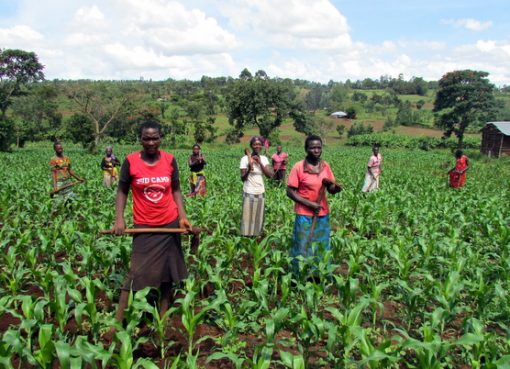Farmers in Nakuru have adopted crop diversification as the County Government provides seedlings to end reliance on dwindling returns from maize.
The devolved unit’s department of Agriculture, Livestock, and Fisheries, in collaboration with Alliance of Biodiversity International (CIAT) and Kenya Agricultural and Livestock Research Organisation (KALRO), has been sensitising farmers to venture into beans, avocado, sunflower, pyrethrum, bamboo, and fish farming to cushion themselves from the woes that have bedevilled the cereal sector for years.
According to County Executive Committee Member (CECM) for Agriculture, Livestock, and Fisheries, Mr. Leonard Bor, the collaborative campaign is promoting diversification of foods as a way of mitigating the effects of climate change, boosting sources of livelihoods, and improving living standards.
Mr. Bor disclosed that Governor Susan Kihika’s administration has also rolled out the distribution of assorted seedlings of avocado, pyrethrum, coffee, and tissue cultures in addition to training over 100 extension officers who are helping farmers carry out successful crop diversification.
“We are incentivising our farmers to practice diversification of crops to improve nutrition in the community while also encouraging more farmers to practice diversification.
The farmers are also being encouraged to cultivate the Nyota bean variety in the short rain season, which is gaining rapid popularity among small-scale and subsistence farmers, boosting yields and ensuring food security and nutrition from the household level in the county,” stated CECM.
He indicated that the devolved unit’s administration was promoting the Nyota bean variety due to its rapid maturity, adaptability to diverse climates, and its high levels of zinc and iron.
The devolved unit, he added, is encouraging farmers to exploit the region’s favourable weather patterns and arable soils and increase their sources of income through crop diversification as a robust risk management strategy to increase production and food security.
Mr. Bor observed that Kenya’s agricultural production is dominated by a narrow range of commodities, which include maize and wheat, as well as cash crops like tea, coffee, and flowers.
He added that their cultivation contributes to the livelihoods of 70 per cent of rural families, causing a concerning overreliance on just a few crops.
Mr. Bor observed that climate change continues to hinder efforts to increase agricultural productivity and food and nutrition security in many developing countries.
The CECM further noted that crop diversification was one of the cheapest ways of dealing with several crop diseases, including the fall army worms in the region.
“By planting maize on the same piece of land, the chances of completely dealing with the problem of destructive pests like the Fall Army Worms are slim. This is because a farmer who plants maize in both short and long rain seasons inadvertently provides enough food for the worms,” explained Mr. Bor.
Besides going for the best maize seed varieties suitable for the soils in the area, the farmers were encouraged to invest in early-maturing crops during the short rain seasons.
Mr. Bor identified sunflowers, Irish potatoes, sorghum, millet, carrots, groundnuts, African leafy vegetables, and soya beans as some of the best early-maturing crops, with most of them classified as drought-resistant besides their nutritional value.
He stated that diversifying production towards non-traditional varieties could help improve agricultural productivity, stabilise output, enhance food security, and mitigate the risk of climate change.
“Diversification not only expands the number of potential crop types for markets but also contributes significantly to household nutrition needs. And while it is neither a one-size-fits-all strategy nor a substitute for specialisation, especially where specific crops are thriving with a market portfolio to match, diversification is the most robust option towards creating resilient agricultural systems that can contribute significantly to household and, subsequently, national food security,” said Mr. Bor.
The CECM indicated that although maize is the country’s biggest and most important crop, by trying different well-suited crops in different regions, farmers in all 11 sub-counties will be able to address their nutritional needs more adequately and cope better with production and marketing fluctuations.
He noted that the national government highlights policy items touching on diversification and value addition in its Vision 2030 economic blueprint, including catalysing enhanced agricultural productivity, food security, and income growth.
The CECM further noted that smallholder farmers are the understated drivers of crop diversification, demanding more productive, resilient, and family-friendly crops when they realise a decreased benefit from staple crops.
Mr. Bor said that there was a need to expand what the devolved unit produces to encourage greater diversification and affordability in diets.
He said other advantages of crop diversification were the facilitation of several employment alternatives for farmers as well as foreign earnings through exportation.
Farming in most parts of Nakuru is mainly rain-fed, which sometimes causes frustration, especially during the dry season when crops fail.
The county executive said if farmers take up high-value crops and those that can withstand drought, then they will be food secure and still have more to sell for their livelihoods.
He indicated that diversifying production towards non-traditional crop varieties could also help improve agricultural productivity, stabilise output, and enhance food insecurity.
Mr. Bor emphasized the farming method also helps in reducing risk factors, thereby ensuring the farmers do not lose all of their resources in case of adverse weather conditions that do not favour crop production.
“In addition, since multiple crops can be harvested from a small field, the production increases tenfold, which ensures a substantial amount of income,” the CECM explained.
He noted that diversification not only expands the number of potential crop types for markets but also contributes significantly to household nutrition needs.
Mr. Bor affirmed that Governor Susan Kihika’s administration had sustained a campaign to revitalise avocado farming, with eyes set on international markets.
He said the devolved unit was collaborating with stakeholders in the avocado subsector in training farmers on enhancing the competitiveness of avocado value-added products.
The CECM observed that the venture, a partnership with the Avocado Society of Kenya (ASOK), mainly targets smallholder farmers, who are also being trained on export processes, quality planting materials, proper farming techniques, farm mechanisation, accessing reliable market links, and affordable credit facilities.
He added that the county was keen on focusing on international markets instead of selling the fruit to middlemen at throwaway prices, where he said they buy the one fruit for about Sh10 and Sh15, reaping huge profits at the expense of farmers.
The CECM indicated that they were encouraging farmers to diversify into the farming of avocados and macadamias alongside other traditional crops like coffee and potatoes.
“We have mainly singled out the avocado crop as a potential income earner for our farmers due to the high demand both locally and internationally. The seedlings will take approximately 18 months to start yielding fruits,” said Mr. Bor.
He at the same time urged avocado farmers to join cooperative societies to boost their incomes and prevent their exploitation by middlemen, adding that through bulking, cooperatives have been able to reduce the cost of marketing and enabled farmers to realise higher returns through the provision of a reliable and remunerative outlet for produce.
The CECM indicated that the devolved unit and its partners were further sensitising the farmers on the new avocado export regulations announced by the Horticulture Crops Directorate towards ensuring that Kenyan fruits are competitive in the global export market.
Mr. Bor observed that climate change continues to hinder efforts to increase agricultural productivity and food and nutrition security in many developing countries.
By Anne Mwale





